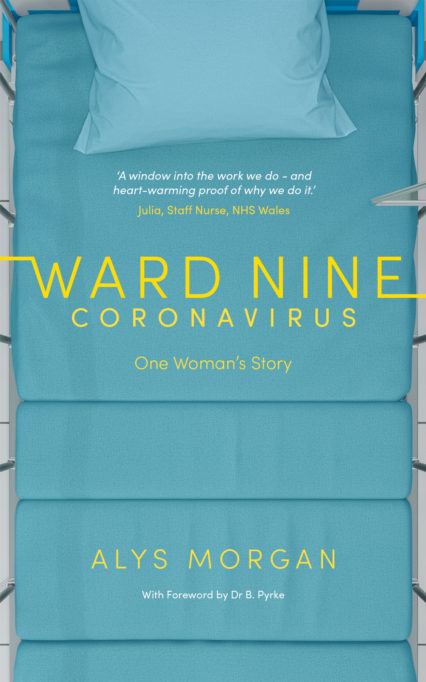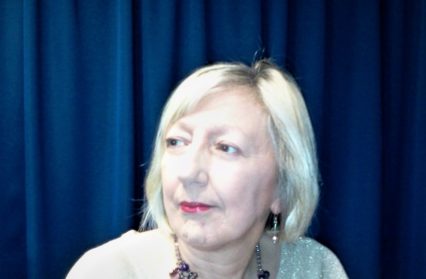Having survived a battle with Covid, Alys Morgan has written an account of her experience in hospital. Here, Kathryn Tann speaks to Morgan to find out more about why she has written the journal and how it has helped her recover.
Earlier this year, Alys Morgan was admitted to hospital after a prolonged bout of excessive sickness. She was given a routine COVID-19 test, which 48 hours later came back positive, though her symptoms were not at the time recognised as such. Her room became part of a growing coronavirus ward, in a north Wales hospital which she would spend the next three weeks in – witnessing one of the NHS’s greatest challenges to date.
Alys approached Parthian in August with her unusual and important story. I was struck by the bareness of its tone, and the impact that such a direct insight could have for readers still very much dealing with the reality of this new virus. Being a small publisher, we made the decision to use our flexibility to publish the journal as quickly as we could, gaining assistance from medical professionals eager to help share the story, including a sobering Foreword from a Frontline Junior Doctor in South Wales.
As editor I’m thrilled to see it so soon in print, and believe Alys’ words will be a force for good in such divided times. I caught up with her this week, as we finally send the books out to shops, to hear a little more about her experience and why she wanted to put it down on paper.
 What made you decide to write an account of your experiences?
What made you decide to write an account of your experiences?
Alys Morgan: I was extremely ill for the first ten days or so of my time in hospital, on a drip and anti-sickness medication. But when my health turned a corner and I started to recover, I began to take an interest in the routine of the ward, and the lives of the other patients, many of whom were women in their 60s, like me.
There was little to do, as there were no books or magazines on the ward. I had brought nothing into hospital with me, and was allowed no visitors. The occupational therapist suggested that I jot down a few notes about my experience on a daily basis, which I did. I sensed that I was an observer, an outsider looking in.
When I left, part of my aftercare package was regular telephone sessions with Conwy Mind, who suggested that I write the notes up into a journal – a form of therapeutic writing. While doing this, I discovered Daniel Defoe’s A Journal of the Plague Year (1722). The comparisons with our own times were astounding, and I decided to let this account run parallel with my own.
So you might say that the book comes from therapeutic reading and writing. But it’s also the heartfelt thank you to NHS Wales and support services that I felt I never expressed adequately while I was in hospital. It’s a love-letter to the NHS.
How did you find the process of recollection? Was it difficult? Helpful?
Alys Morgan: It was easy to remember what had happened, but it was painful and difficult. My husband and friends read early drafts of the journal, and found it hard – the experience was still raw. But writing about it helped, and also enabled me to say things I had not said at the time.
Do you think writing could be a valuable form of therapy for others in your situation? Should we be encouraging creativity in these times?
Alys Morgan: Yes, I firmly believe so. The journal was first published in Tales of Lockdown, a project curated by The Hearth Centre, which looks at the effects COVID and lockdown have had on our physical and mental health. Even if people haven’t had COVID, they are suffering from stress and anxiety, and it was obviously therapeutic to write about and share this experience. It was reading and writing that got me through my experience. And it’s such an opportunity for us to create a record of our times for future generations. It’s a bad time for the arts generally at the moment, but maybe creativity can deliver new ways for the arts to go forward. It’s encouraging that so many are reading and writing at this time.
In your story, you expose certain sections of society – such as older working women like yourself – who have their own narratives during this pandemic which, perhaps, aren’t being heard. Do you think this year has highlighted certain hidden issues in our society, or have they always been there for us to take notice of?
Alys Morgan: Yes – I think my telephone counselling highlighted that there were some difficult issues in my life which I’d been able to deal with until I was unwell, but my illness brought them to the surface. It was then that I realised the importance of emotional health and how this issue requires more funding.
I’m particularly interested in my book in the plight of older women who are now having to work on or care for others in their 60s. Many of the women on my ward had essential front line jobs, or cared for family members, and it was this that had exposed them to infection at the very time when they were being advised to shield. Many were in part time and minimum pay if essential occupations which meant that they had never been able to pay into a private pension fund, and the raising of the state pension age meant they were having to struggle on until they were 66.
Care for the elderly was also an issue on the ward – where were older people to be sent in order to recover? And there are of course all the issues regarding the NHS – staffing, pay, equipment, and student loans which nurses are struggling to pay back.
Why is now such an important time for people to be reading narratives like yours?
Alys Morgan: Because it isn’t over – we have already moved into a second wave, and maybe there will be a third. The divisions between us are stronger than ever, and we can’t necessarily rely on the arrival of an effective vaccine. But also because we need to realise that there is hope, and there is help. That at the worst of times, the best of us will move to the forefront.
What would you say to those who are, perhaps understandably, tired of the pandemic, and reluctant to engage with more stories and information related to it?
Alys Morgan: That it isn’t over. And that we have a debt of gratitude that we should never forget – in particular to those NHS and essential workers who died fighting the virus. We need to remember everyday stories of courage in the face of death, and the sacrifices that quite ordinary people made.
And there are other long term effects to consider – the effect on the economy of the UK, and the effect it is having on the mental health of the nation in terms of stress and anxiety. These issues are not going to go away, and we need to be thinking about how we are going to deal with them.
This second wave is arguably a bigger threat to our hospitals because of the backlog of treatment not given earlier and the necessary continuation of normal services. There’s been time for staff to learn and adapt, but there has also been time for the rest of us to forget or become complacent. How do you feel about the coverage being given to the NHS right now, as they struggle to cope with patient numbers far higher than before?
Alys Morgan: I have read a BBC article this morning about how the Royal Glamorgan Hospital is struggling to cope. I think everyone needs to read this article from the front line. The doctor speaking, Dr Ceri Lynch, thinks the situation is now worse than it was in the spring. As well as coping with a new wave of COVID, they are trying to keep normal services running. In addition, there is a huge toll on the emotional health of the staff who are having to watch people die. And staff are quite simply physically exhausted. Clapping for them isn’t enough – we need to think how we can support them. We need to listen.
Alys Morgan’s journal, Ward Nine: Coronavirus, is available to now from Parthian. For every book sold, Parthian will donate 10% of the cost to Mind Conwy to help them support those affected by the pandemic.












